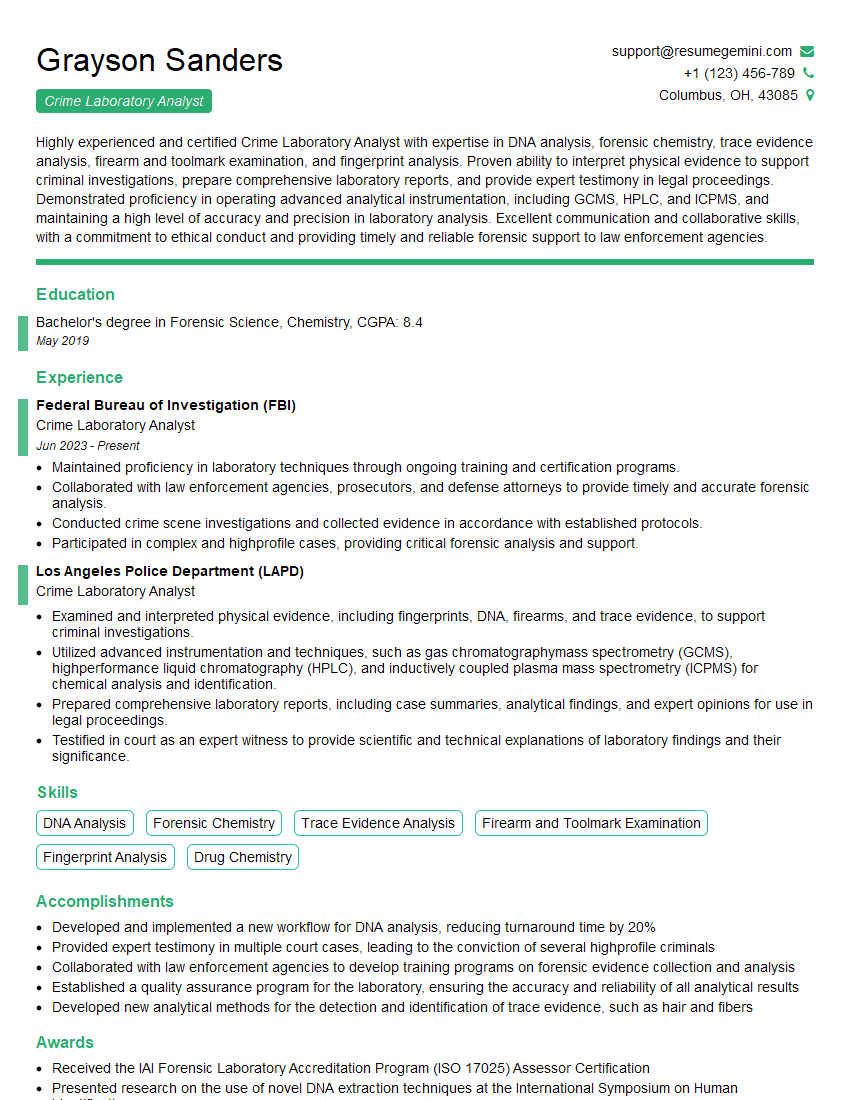Are you a seasoned Crime Laboratory Analyst seeking a new career path? Discover our professionally built Crime Laboratory Analyst Resume Template. This time-saving tool provides a solid foundation for your job search. Simply click “Edit Resume” to customize it with your unique experiences and achievements. Customize fonts and colors to match your personal style and increase your chances of landing your dream job. Explore more Resume Templates for additional options.

Grayson Sanders
Crime Laboratory Analyst
Summary
Highly experienced and certified Crime Laboratory Analyst with expertise in DNA analysis, forensic chemistry, trace evidence analysis, firearm and toolmark examination, and fingerprint analysis. Proven ability to interpret physical evidence to support criminal investigations, prepare comprehensive laboratory reports, and provide expert testimony in legal proceedings. Demonstrated proficiency in operating advanced analytical instrumentation, including GCMS, HPLC, and ICPMS, and maintaining a high level of accuracy and precision in laboratory analysis. Excellent communication and collaborative skills, with a commitment to ethical conduct and providing timely and reliable forensic support to law enforcement agencies.
Education
Bachelor’s degree in Forensic Science, Chemistry
May 2019
Skills
- DNA Analysis
- Forensic Chemistry
- Trace Evidence Analysis
- Firearm and Toolmark Examination
- Fingerprint Analysis
- Drug Chemistry
Work Experience
Crime Laboratory Analyst
- Maintained proficiency in laboratory techniques through ongoing training and certification programs.
- Collaborated with law enforcement agencies, prosecutors, and defense attorneys to provide timely and accurate forensic analysis.
- Conducted crime scene investigations and collected evidence in accordance with established protocols.
- Participated in complex and highprofile cases, providing critical forensic analysis and support.
Crime Laboratory Analyst
- Examined and interpreted physical evidence, including fingerprints, DNA, firearms, and trace evidence, to support criminal investigations.
- Utilized advanced instrumentation and techniques, such as gas chromatographymass spectrometry (GCMS), highperformance liquid chromatography (HPLC), and inductively coupled plasma mass spectrometry (ICPMS) for chemical analysis and identification.
- Prepared comprehensive laboratory reports, including case summaries, analytical findings, and expert opinions for use in legal proceedings.
- Testified in court as an expert witness to provide scientific and technical explanations of laboratory findings and their significance.
Accomplishments
- Developed and implemented a new workflow for DNA analysis, reducing turnaround time by 20%
- Provided expert testimony in multiple court cases, leading to the conviction of several highprofile criminals
- Collaborated with law enforcement agencies to develop training programs on forensic evidence collection and analysis
- Established a quality assurance program for the laboratory, ensuring the accuracy and reliability of all analytical results
- Developed new analytical methods for the detection and identification of trace evidence, such as hair and fibers
Awards
- Received the IAI Forensic Laboratory Accreditation Program (ISO 17025) Assessor Certification
- Presented research on the use of novel DNA extraction techniques at the International Symposium on Human Identification
- Received the American Academy of Forensic Sciences (AAFS) Distinguished Fellow Award
- Recognized as a Certified Crime Laboratory Analyst (CCLA) by the American Society of Crime Laboratory Directors (ASCLD)
Certificates
- American Board of Criminalistics
- American Society of Crime Laboratory Directors
- International Association for Identification
- National Association of Medical Examiners
Career Expert Tips:
- Select the ideal resume template to showcase your professional experience effectively.
- Master the art of resume writing to highlight your unique qualifications and achievements.
- Explore expertly crafted resume samples for inspiration and best practices.
- Build your best resume for free this new year with ResumeGemini. Enjoy exclusive discounts on ATS optimized resume templates.
How To Write Resume For Crime Laboratory Analyst
- Highlight your expertise in specific forensic analysis techniques, such as DNA analysis or firearms examination.
- Showcase your experience in testifying as an expert witness and your ability to clearly and effectively communicate technical information to legal professionals.
- Emphasize your commitment to ethical conduct and your understanding of the legal implications of your work.
- Quantify your accomplishments whenever possible, using specific metrics to demonstrate the impact of your work.
- Proofread your resume carefully for any errors in grammar, spelling, or formatting.
Essential Experience Highlights for a Strong Crime Laboratory Analyst Resume
- Examined and interpreted physical evidence, including fingerprints, DNA, firearms, and trace evidence, to support criminal investigations.
- Utilized advanced instrumentation and techniques, such as GCMS, HPLC, and ICPMS for chemical analysis and identification.
- Prepared comprehensive laboratory reports, including case summaries, analytical findings, and expert opinions for use in legal proceedings.
- Testified in court as an expert witness to provide scientific and technical explanations of laboratory findings and their significance.
- Maintained proficiency in laboratory techniques through ongoing training and certification programs.
- Collaborated with law enforcement agencies, prosecutors, and defense attorneys to provide timely and accurate forensic analysis.
Frequently Asked Questions (FAQ’s) For Crime Laboratory Analyst
What are the educational requirements to become a Crime Laboratory Analyst?
A bachelor’s degree in forensic science, chemistry, or a related field is typically required.
What are the key skills and experience required for this role?
Key skills include knowledge of forensic analysis techniques, proficiency in operating scientific equipment, and strong communication and interpersonal skills.
What does a typical day look like for a Crime Laboratory Analyst?
A typical day may involve examining evidence, conducting tests, analyzing data, and preparing reports.
What are the career advancement opportunities for a Crime Laboratory Analyst?
With experience and additional training, analysts can advance to supervisory roles or specialize in specific areas of forensic analysis.
What is the job outlook for Crime Laboratory Analysts?
The job outlook is expected to remain favorable due to the increasing need for forensic analysis in criminal investigations.
What are the ethical considerations in forensic analysis?
Crime Laboratory Analysts must adhere to strict ethical guidelines to ensure the integrity and objectivity of their work.